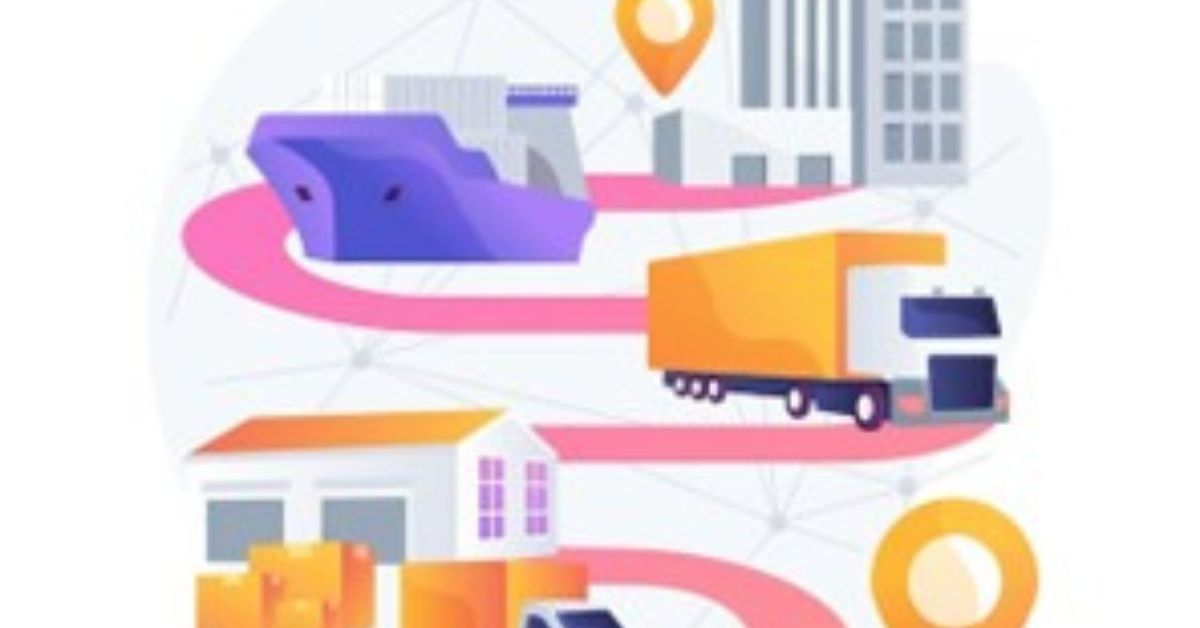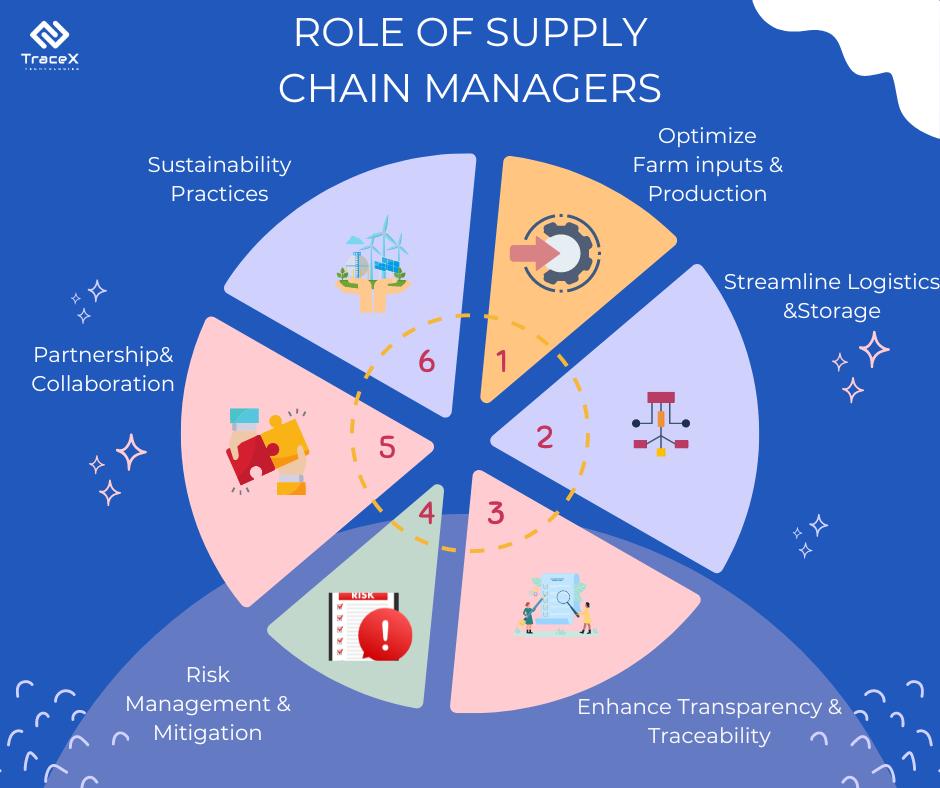Contact: +91 99725 24322 |
Menu
Menu
Quick summary: Discover how blockchain technology is reshaping supply chain traceability for managers. Explore strategies, challenges, and benefits tailored to enterprise needs in our insightful blog on supply chain traceability.

Today, Traceability for Supply chain managers is important in orchestrating the intricate web of processes and activities that govern modern supply chains. In today’s rapidly evolving business landscape, the need for transparency, accountability, and efficiency has never been greater. Supply chain managers are constantly challenged to optimize operations, mitigate risks, and ensure compliance with regulatory standards.
At the heart of these endeavours lies the concept of traceability – the ability to track and trace products, materials, and information throughout the supply chain. In this context, supply chain managers need to stay abreast of the latest developments in traceability solutions to effectively address the myriad challenges they face.
Traceability in food supply chains is akin to a reliable navigation system guiding the industry towards efficiency, transparency, and accountability. This practice involves tracking the journey of agricultural products from farm to fork, and its importance cannot be overstated.
One of the primary advantages of traceability in food supply chains is the ability to ensure food safety. By tracing the origin of products, identifying potential contamination sources becomes feasible. In the event of a foodborne illness outbreak or contamination scare, traceability allows for swift and targeted recalls, minimizing the impact on consumers and the reputation of the agricultural industry. This capability not only safeguards public health but also instills trust in the food supply chain.
Beyond safety concerns, traceability plays a crucial role in quality assurance. Farmers, producers, and distributors can monitor each stage of the production process, from planting seeds to harvesting crops and packaging the final product. This comprehensive oversight ensures adherence to quality standards, helping maintain the integrity of agricultural products. Consumers benefit from knowing that the food they purchase meets stringent quality requirements.
In addition to safety and quality, traceability contributes to sustainability in agriculture. As consumers become more environmentally conscious, there is a growing demand for products that are produced with minimal ecological impact. Traceability allows for the monitoring of farming practices, promoting sustainable and eco-friendly approaches. It enables consumers to make informed choices, supporting agricultural practices that align with their values.
Also, traceability enhances supply chain efficiency. With a clear record of product movement, farmers and distributors can identify bottlenecks, streamline processes, and optimize the flow of goods. This efficiency not only reduces waste but also contributes to cost-effectiveness throughout the agricultural supply chain.
In today’s interconnected world, where consumers are increasingly curious about the origins of their food, traceability serves as a tool for storytelling. It allows farmers to share their practices, highlight their commitment to sustainability, and build a connection with consumers. This transparency creates a sense of accountability within the industry, encouraging responsible and ethical practices.
Explore how blockchain technology is revolutionizing food traceability
Discover the transformative power of decentralized ledgers in ensuring transparency, authenticity, and accountability across the entire food supply chain.
Supply chain managers play a crucial role in agriculture value chains by overseeing the movement of goods, information, and finances from farm to table. Their responsibilities include:
Overall, supply chain managers play a vital role in optimizing efficiency, reducing costs, and maximizing value creation within agriculture value chains.

Supply chain managers in agriculture face various challenges, including:
Addressing these challenges requires strategic planning, technology adoption, collaboration among stakeholders, and continuous improvement initiatives within agriculture supply chains.
At its core, traceability in the supply chain refers to the ability to track and trace the movement of products and raw materials from their origin to the end consumer. Traceability solutions leverage technology to provide a detailed, real-time view of the entire supply chain, offering insights into each step of the journey.
The primary purpose of traceability is two-fold: enhancing operational efficiency and ensuring accountability. By knowing exactly where a product is at any given moment, supply chain managers can streamline processes, reduce inefficiencies, and respond swiftly to challenges, such as recalls or disruptions.
The bedrock of traceability solutions, barcodes and QR codes encode information about products or batches. Scanning these codes at different stages of the supply chain allows for easy tracking and tracing, providing a simple yet effective solution for monitoring product movement.
Radio-frequency identification (RFID) takes traceability a step further. RFID tags use radio waves to transmit data, enabling real-time tracking without the need for direct line-of-sight scanning. This technology is particularly beneficial in large-scale warehouses and distribution centers.
Blockchain technology is revolutionizing traceability by creating an immutable, transparent ledger of transactions. Each step in the supply chain is recorded in a block, forming an unbroken chain of information. This decentralized approach ensures data integrity and builds trust among stakeholders.
Traceability solutions provide supply chain managers with unparalleled visibility into the movement of products. From manufacturing to distribution and retail, every stage is tracked, offering a comprehensive overview that facilitates better decision-making.
By tracing products back to their origins, supply chain managers can implement rigorous quality control measures. This not only ensures compliance with industry standards but also enables quick identification and resolution of issues, reducing the risk of product recalls.
Real-time data provided by traceability solutions allows for the identification of bottlenecks and inefficiencies in the supply chain. Supply chain managers can then implement corrective measures promptly, optimizing the overall efficiency of operations.
Before implementing traceability solutions, supply chain managers must conduct a thorough assessment of their specific needs and potential risks. Factors such as the type of products, supply chain complexity, and regulatory requirements should be considered.
The selection of the appropriate traceability technology depends on various factors, including the nature of the products, the scale of operations, and the budget. Collaborating with technology experts and solution providers can help in choosing the right fit for the supply chain.
Implementing traceability solutions requires not only technological integration but also training for the workforce. Supply chain managers should ensure that the entire team is familiar with the new systems to maximize the benefits.
TraceX blockchain traceability solutions offer supply chain managers a comprehensive approach to addressing key challenges. By leveraging blockchain technology, TraceX ensures end-to-end visibility and transparency across the supply chain, mitigating the risks of counterfeit products, food contamination, and unethical practices. The immutable nature of blockchain records enhances product authentication and compliance verification, reducing the incidence of fraud and ensuring product integrity. Moreover, TraceX streamlines tracking and tracing processes, enabling efficient recall management and supporting regulatory compliance and reporting requirements. With TraceX, supply chain managers can optimize operations, build trust with stakeholders, and uphold the highest standards of product quality and safety.
Attention Supply Chain Managers! Uncover the power of blockchain technology in revolutionizing supply chain traceability
Gain insights tailored to enterprise needs, guiding you through the integration of blockchain solutions to optimize transparency, efficiency, and trust in your supply chain operations.
The future of traceability extends beyond mere tracking; it encompasses ethical considerations such as sustainability and responsible sourcing. Supply chain managers need to be aware of evolving consumer preferences and regulatory trends, ensuring that traceability solutions align with broader sustainability goals.
As AI continues to advance, integrating it with traceability solutions can enhance predictive analytics, demand forecasting, and decision-making. Supply chain managers should keep an eye on AI developments to stay ahead in the rapidly evolving landscape.
In the ever-evolving landscape of supply chain management, traceability solutions stand out as a cornerstone for efficiency, accountability, and adaptability. Supply chain managers must not only grasp the fundamentals of traceability but also stay abreast of emerging technologies and changing consumer expectations. As traceability becomes not just a necessity but a differentiator in the market, embracing these solutions is the key to building resilient and transparent supply chains that stand the test of time.
